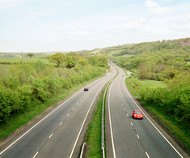7/10/2014
UK: Government, Public Rejects Environmental Speed LimitsAfter 93 percent of public rejects environmental speed limit proposal, UK Highways Agency drops the plan.

In the US and Great Britain, traffic engineers have promoted environmental speed limits as a way to meet strict air quality standards set by regulatory bodies like the US Environmental Protection Agency and the European Union. They work by mandating a lower speed limit during working hours, a change that is supposed to clean the air. Ninety-three percent of the British public thought this was a terrible idea, and the UK Highways Agency on Wednesday officially dropped it.
"Let me be absolutely clear, I want all motorways to run at 70 MPH," Transport Secretary Patrick McLoughlin said in a statement. "While it sometimes makes sense to use variable limits to keep people moving, blanket reductions are not acceptable."
The highway speed limit in the UK is 70 MPH. Under the rejected proposal, the roads would be dubbed "smart motorways" with electronic speed limit signs that would display a lower 60 MPH limit between 7am and 7pm on weekdays and weekends. As part of the rulemaking process, the agency sought public comment on the plan.
"Do you consider that the proposal to introduce a maximum mandatory 60 MPH speed limit is an acceptable measure to mitigate any adverse impacts that these schemes could have on local air quality?" the consultation asked.
The response was a resounding "no." One-third of the responses that favored the idea came from government officials, including speed camera partnerships. Most of the remainder coming from special interest groups, including environmentalist organizations. The department characterized the response to the plan.
"The overriding theme is one of opposition to any form of a maximum speed limit below the national speed limit on a motorway," the Highways Agency explained. "Some respondents questioned the validity, reliability or even the existence of supporting environmental evidence... Some people thought that the proposal would actually cause more pollution because it would create slow moving traffic, congestion, braking or standing traffic, which would 'inevitably' cause more pollution... Some respondents saw the proposal as a way to generate funds via speed cameras."
The larger "smart motorway" concept lives on as McLoughlin on Wednesday announced construction was to begin on the M1 and M3.
"The new schemes are central to the government's long term economic plan and part of £24 billion [US $41 billion] of investment in the road network by 2021, which will see spending tripled to £3 billion [US $5 billion] each year on England's key highways and motorways," the agency explained. "The national speed limit on these sections will remain at 70 MPH."
Instead of changing the speed limit, electronic signs will inform motorists when they can drive on the road shoulder, creating extra capacity on the road. Closed circuit TV cameras would monitor the shoulder and close it in the event of an accident.
A copy of the consultation report is available in a 700k PDF file at the source link below.


